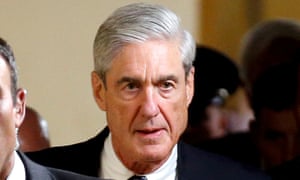The FBI inquiry into alleged Russian collusion in the 2016 US presidential election has been given a second memo that independently set out some of the same allegations made in a dossier by Christopher Steele, the British former spy.
The second memo was written by Cody Shearer, a controversial political activist and former journalist who was close to the Clinton White House in the 1990s.
Unlike Steele, Shearer does not have a background in espionage, and his memo was initially viewed with scepticism, not least because he had shared it with select media organisations before the election.
However, the Guardian has been told the FBI investigation is still assessing details in the “Shearer memo” and is pursuing intriguing leads.
One source with knowledge of the inquiry said the fact the FBI was still working on it suggested investigators had taken an aspect of it seriously.
It raises the possibility that parts of the Steele dossier, which has been derided by Trump’s supporters, may have been corroborated by Shearer’s research, or could still be.
The revelation comes at a moment when Donald Trump and some Republican lawmakers have been seeking to cast doubt on the credibility of the Mueller inquiry and the motivation of the FBI in examining Russian collusion, including unproven allegations that investigators had a bias in favour of Hillary Clinton when the investigation was initially launched before November.
Republicans on the House intelligence committee voted on Monday night to release a highly contentious memo, commissioned by the Republican chairman of the committee, Devin Nunes. The memo reportedly claims the FBI had an anti-Trump bias when it sought a warrant from the US foreign intelligence surveillance court to collect intelligence on Carter Page, an adviser to the Trump campaign. The Fisa court is a secret court that examines law enforcement requests to surveil Americans suspected of acting as foreign agents.
The Republican memo reportedly alleges that the FBI relied on the Steele dossier, which was partly paid for using Democratic funds, in seeking the Carter Page warrant, according to the New York Times.
Democrats have said that the Republican allegations are misleading and based on selective use of classified materials. Justice department officials have said the release of the document, because of the classified elements, would be “extraordinarily reckless”.
Trump now has five days to decide whether the Nunes document should become public.
The Shearer memo was provided to the FBI in October 2016.
It was handed to them by Steele – who had been given it by an American contact –after the FBI requested the former MI6 agent provide any documents or evidence that could be useful in its investigation, according to multiple sources.
The Guardian was told Steele warned the FBI he could not vouch for the veracity of the Shearer memo, but that he was providing a copy because it corresponded with what he had separately heard from his own independent sources.
Among other things, both documents allege Donald Trump was compromisedduring a 2013 trip to Moscow that involved lewd acts in a five-star hotel.
The Shearer memo cites an unnamed source within Russia’s FSB, the state security service. The Guardian cannot verify any of the claims.
Shearer is a controversial figure in Washington. Conservative outlets have accused him of being part of a “hatchet man” and member of a “secret spy ring” and within Clinton’s orbit. There is no evidence that the Clinton campaign was aware of the Shearer memo.
But other people who know Shearer say he is not just a Democratic party hack and there is no evidence that his memo was ever sought by Clinton campaign officials.
Sources say that while he lacks the precision and polish of a seasoned former spy like Steele, Shearer has also been described as having a large network of sources around the world and the independent financial means to pursue leads.
The White House has vigorously denied allegations that the US president was ever compromised and has rejected claims that campaign officials ever conspired with the Kremlin before the 2016 election.
Steele’s dossier, his motives for writing it and his decision to share it remain controversial among Republicans.
He says he approached the FBI about concerns he had about links between Russiaand the Trump campaign after he was commissioned to investigate the matter by a private investigative firm called Fusion GPS on behalf of the firm’s clients.
Glenn Simpson, the founder of Fusion GPS, told congressional investigators that Steele approached the FBI out of a sense of duty and concern for US national security.
Republican supporters of Trump have derided it as “fake news”. Chuck Grassley, a Republican senator from Iowa and ally of Trump, has called for an investigation into Steele amid unspecified allegations about the former spy’s conduct.
Democrats have said the campaign against Steele is part of an effort to seek to discredit him in order to shift attention away from allegations about Trump and Russia.
Spokespeople for the FBI and the US special counsel leading the criminal investigation into the Trump campaign declined to comment. Shearer did not return emails and calls for comment.
A federal criminal investigation into the Trump campaign has so far resulted in four indictments. Two former Trump campaign officials, including Michael Flynn, Trump’s former national security adviser, have pleaded guilty to perjury and are cooperating with Robert Mueller, the special counsel who is leading the ongoing investigation.











Post a Comment